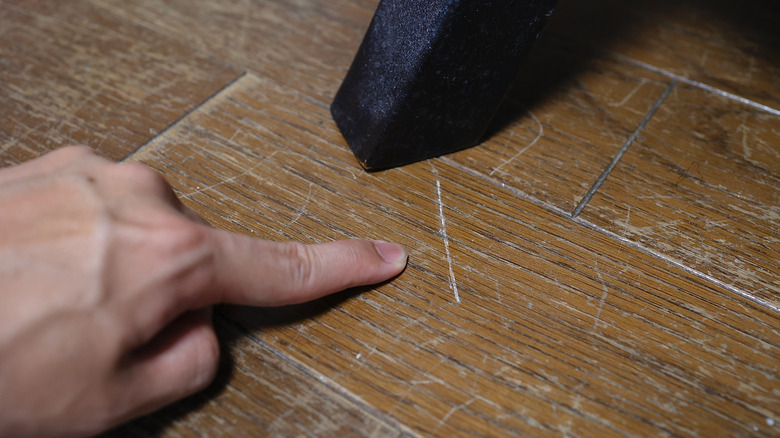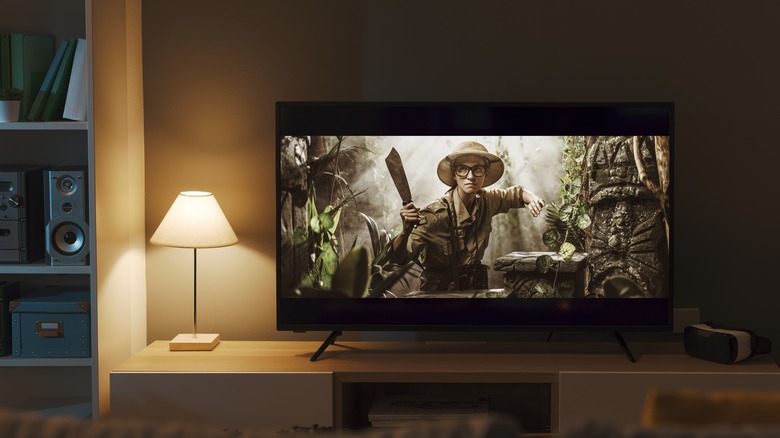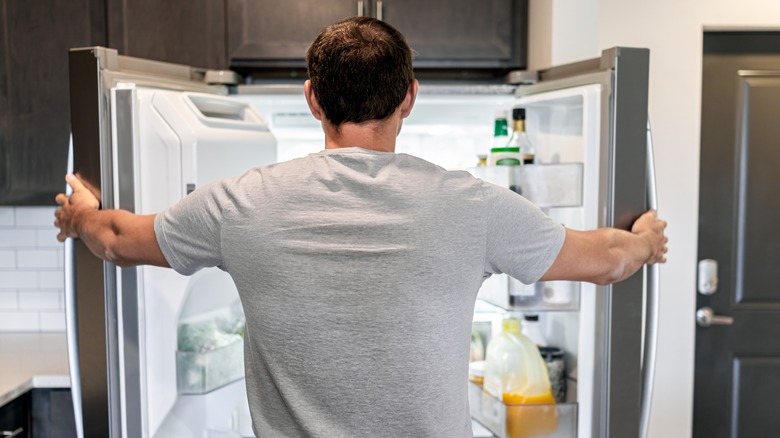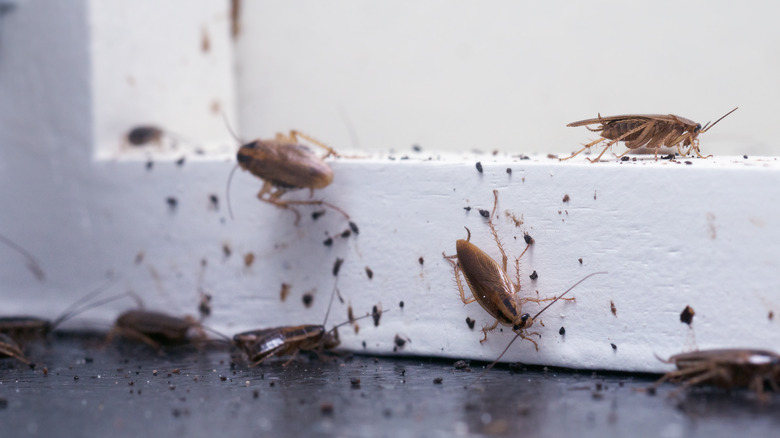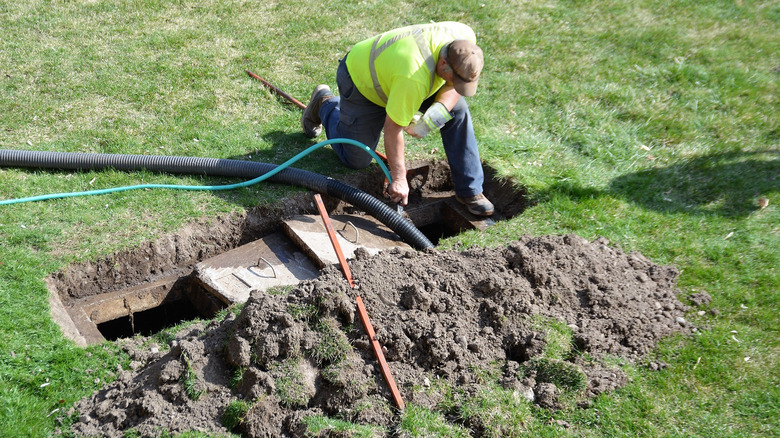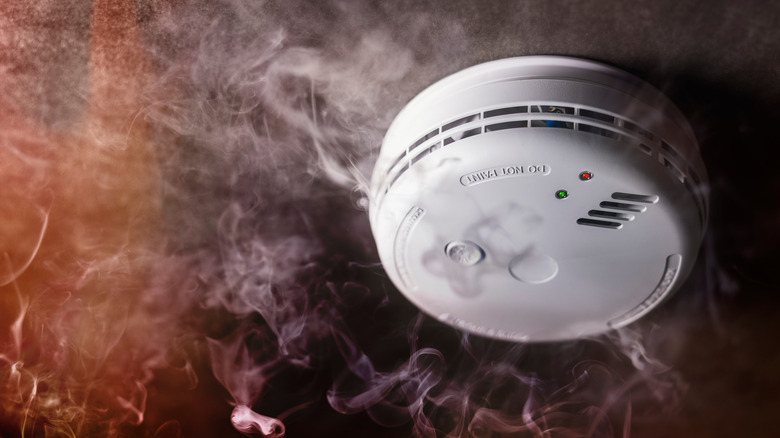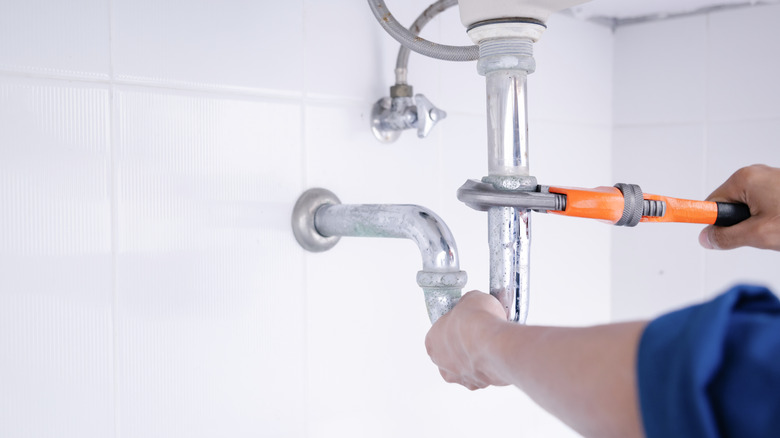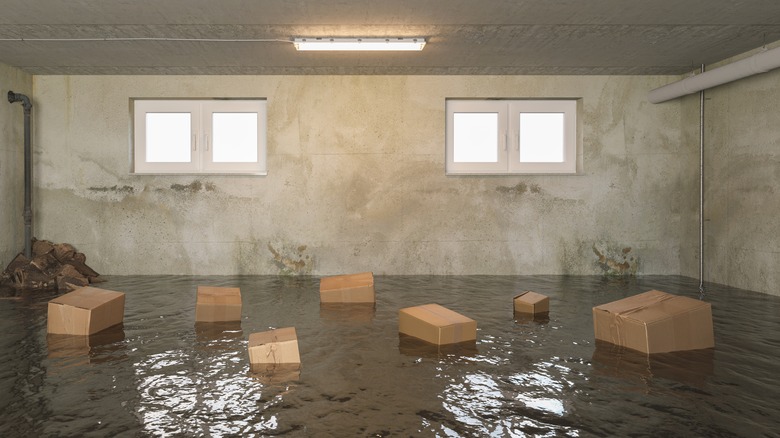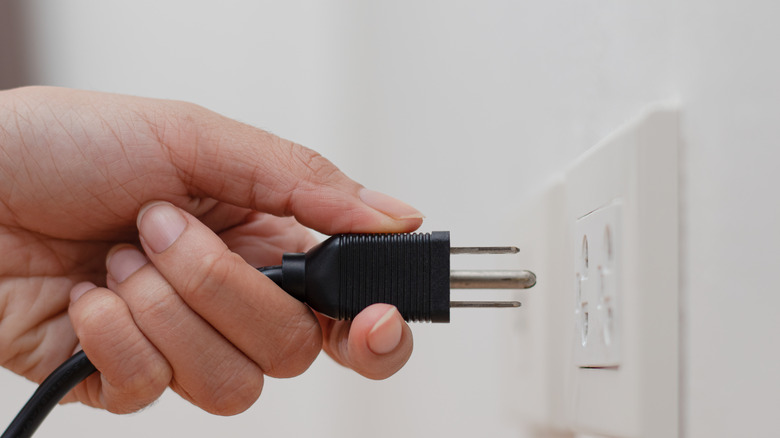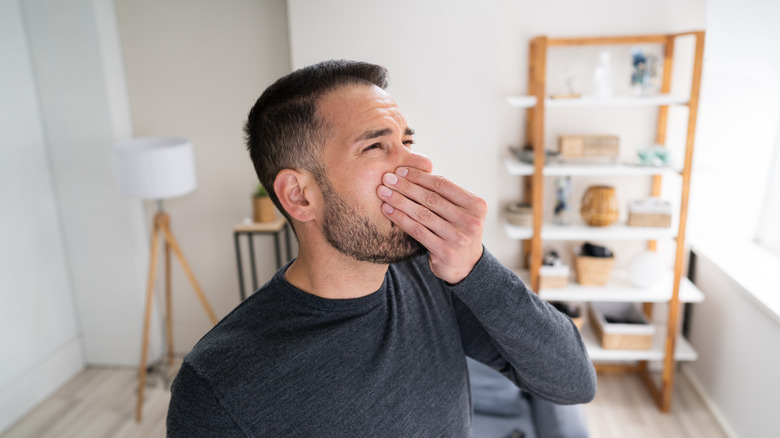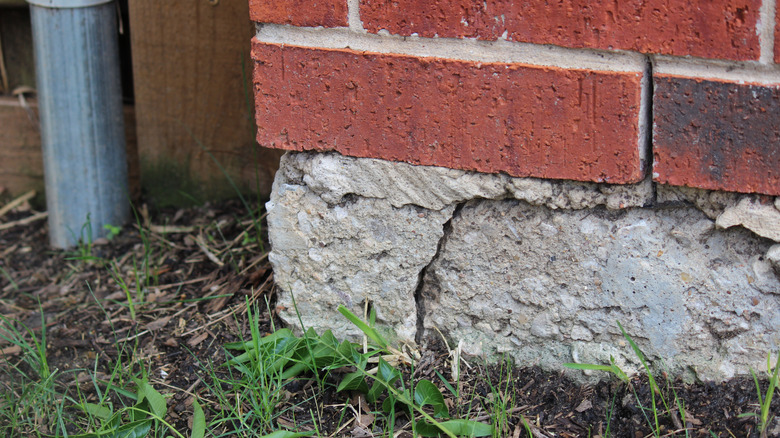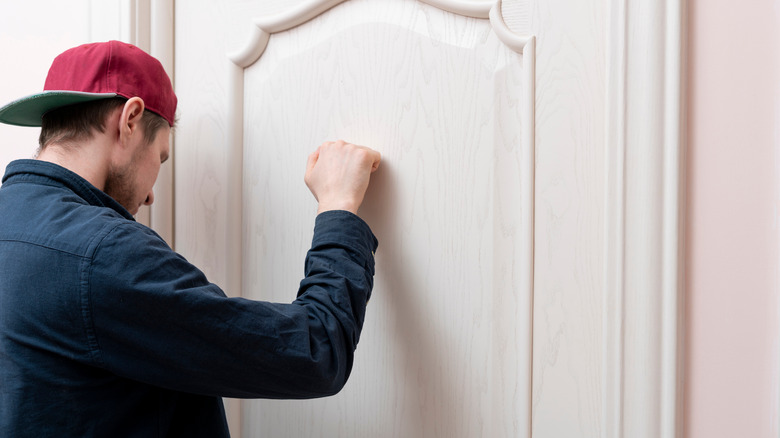The Main Problems To Look Out For When Renting A House
When you purchase a home, you hire a home inspector to make sure everything is in order. The inspector looks for things like problems with the home's foundation, evidence of shoddy DIY construction, and even plain ol' squeaky doors. However, if you are interested in renting a house instead of buying one, you still shouldn't skip this step.
According to RentPrep, landlords can inspect your home while you live there to make sure you are taking care of it. They look for things like mold, pests, and damage to the walls, floors, etc. Typically, they do inspections before you move out to see if they need to use your security deposit to fix any damages; however, sometimes, they can schedule a time to just check up on things. So, to protect yourself and make sure that you are moving into the kind of home that you want, you should do the same before you move in. Here are the main problems to look out for when you want to rent a house.
Stains and scuffs on the floor
Take note of any marks on the floor. This could be things like stains on the carpet, or scuffs and tears on the hardwood, tile, or linoleum. If you don't make note of them during the inspection report, you might be charged for them when you move out. Some landlords can be sneaky like that. However, if you do end up adding any scratches or stains of your own, it's not the end of the world. You can also give getting rid of them a go if you can't stand how they look.
According to RentFaster, it's possible to remove stains from a carpet (or at least dramatically improve their appearance) by using a few natural remedies. The first is to use a mixture of one part vinegar and two parts water. Spray the mixture onto the stain and let it soak for a moment or two. Then, dab it off with a wet cloth. If the stain was in the house long before you moved in, you might need to repeat this step a few times. You can also use other natural remedies like vinegar and baking soda, or chemicals like ammonia. Whatever you choose to use, consider wearing a mask and opening the windows, so you don't breathe in any noxious fumes.
Lights that don't work
If you spot a light that is flickering or not working during your inspection, ask if it can get fixed ahead of time to avoid having to call the landlord back out once you move in. Sometimes, lightbulbs are the responsibility of the tenant, but other times they are not. Be sure to check your rental agreement to understand who needs to pay for repairs like these. It is important to get them sorted right away, as electrical hazards can be very dangerous in the home.
According to Ting, sometimes a flickering light has nothing to do with a dying lightbulb. Perhaps it's a sign that your friends are trying to reach you from the Upside Down. But, if you aren't living in an episode of "Stranger Things," flickering lights — especially when you turn on the TV, start the dryer, etc. — are a sign of too much strain on the home's electrical system, or faulty wiring. You should also listen for hissing, cracking, and popping sounds when flipping light switches, as these can also be signs of an underlying problem.
Appliances on their last leg
When renting a house, it is normal to assume that you do not need to supply your own appliances. However, this might be the case in some rental situations. If the house does come with appliances, it is important to make sure that they are all in working order. You might want to ask when the dishwasher was last replaced, or maybe about how recently the fridge has been serviced.
According to Howard's, you can tell that a refrigerator is about to die because condensation will begin to appear on the outside of the fridge. This is easy enough to spot during an inspection, as is excess frost inside the freezer. If you move in, keep an eye on how quickly your food spoils as well. If your fridge is on the way out, food will go bad quicker than the expiration date indicates, because the temperature won't be quite right. It's a similar thing for a dishwasher or oven. If the dishes are coming out dirty, or if the oven isn't heating up correctly, notify your landlord. They will either need to service the appliance or have it replaced.
Evidence of pests
Can you see evidence of roaches in the apartment? What about mice? You don't want to move into a place that already has a pest problem, lest you be blamed for it. According to Brody Brothers Pest Control, a telltale sign that there is a mouse problem in a house is mouse droppings. Mice also tend to chew, so you might see little nibbles taken out of food in the kitchen, or on cardboard packages — if there are any out during the showing.
Another common pest issue in rentals is roaches. In apartments, it can be hard to get rid of them because the main nest might not be in your unit, so no matter how many you kill, they might keep coming back. However, if you are renting a stand-alone home, it can be easier to get rid of them because you aren't connected to your neighbors. You can usually tell if there are roaches in a house because their waste looks like specks of black pepper or spilled coffee (via Orkin). You are most likely to find it in the kitchen and bathroom. The waste typically doesn't have a smell, but is very noticeable, especially in warm, small spaces like behind the microwave or under the coffee pot.
Evidence of a malfunctioning septic tank
Most houses in urban areas tend not to use septic systems, as they are on city water. But, if the house you rent has a septic system, there are some things you should know and look out for. This is because, even if you are just renting, correcting any issues with the septic tank is a huge endeavor (not to mention very smelly).
According to the Washington State Department of Health, if a septic system fails, raw sewage starts popping up in places that you really don't want it to. This could be your backyard, your basement, or even flowing out of your toilets. When renting, be sure to ask your landlord if the home uses a septic tank. If so, ask about its service history, as well as any problems with it. The unfortunate thing is that issues with septic tanks often come from backups, which occur over time. Meaning, the behavior of previous tenants might impact you. For example, a previous tenant may have flushed diapers down the toilet, caused a clog, and now your landlord is blaming you for it — even though you don't even have a baby.
The temperature of the home
Not all homes have an HVAC system, especially older homes. However, if you are touring a new construction, or it's clear that there is one present, then you need to make sure it is working correctly. If the home is boiling hot when you tour it, it could be a sign that it's not. According to All American Heating & Cooling, if the temperature is set to a cooler number, but the system is still blowing hot air, then there could be an issue with restricted airflow or the compressor.
In addition to this, if the level of humidity in the home seems to be unusually high (fogged up windows, sticky feeling air), then there is something wrong. The crisp air from your HVAC system should automatically act as a dehumidifier. Though, in some climates, a separate dehumidifier machine might be necessary. If this is the case, speak to your landlord before signing the lease to get a better understanding of the situation.
Lack of visible safety equipment
It's usually up to the landlord to provide the standard safety equipment, such as smoke and carbon monoxide detectors. Therefore, when you are visiting a home you want to rent, keep an eye out. Does the home come with a smoke alarm or a carbon monoxide monitor? What about a fire extinguisher? Will you need to provide these?
According to First Alert, you can't taste, see, or smell carbon monoxide. Because of this, there are unfortunately many deaths from the gas each year. With this grim detail, it's often referred to as the "silent killer." If you are renting a house with gas appliances, you should have one in the building, in the case that a gas leak occurs. However, laws differ and some rentals might not make carbon monoxide monitors available, so you'll need to get one yourself and know when to replace it. Smoke alarms should also be placed on every level of a home to keep you safe from fires (via Kidde).
Broken plumbing
When you are walking through a potential rental, it's okay to flush the toilet or turn on the tap. You do this to make sure all is in working order before you sign a contract to live there. According to Bell Brothers, there are a few surefire ways to tell if your plumbing is about to fail. If you notice any of these signs of faulty pipes at a rental, you are likely going to be in for a headache while your landlord sorts it out. In addition, a pipe burst or overflowing toilet can cause damage to your personal property. So, plumbing issues are actually a very big risk to tenants.
If you turn on the faucet and hear any strange sounds, like screeching or hissing, it means there is too much air in the pipes. If the water pressure is too low, it could indicate a blockage, or it could just mean that the home has terrible water pressure, so you will need to think about whether that's going to be an issue for you. You might also check to see how long it takes the sink to drain. Is it quick, or does there appear to be a blockage?
Water damage in the basement
If the home you are renting has a basement, check to see if it has a history of flooding. This could be from natural causes like excess rain in the area, or from a man-made problem like a faulty pipe. According to Basement Systems, the most obvious sign of water damage is, well, standing water. This might seem like a no-brainer, but if you don't even glance in the basement during your visit, you might end up storing personal items down there and having them ruined.
Next, keep an eye out for any mold or mildew. It would typically be growing on the ceiling and walls, as it's a sign of too much moisture and not enough ventilation in the space. It is usually accompanied by a strange musty smell. Another great way to check for evidence of flooding is by looking for efflorescence. Efflorescence is the white, chalk-like stain that you will see on stone or concrete when water dries — it's the left behind minerals from the water.
Lack of electrical outlets
If most rooms don't have the correct number of electrical outlets, it will soon become a nuisance during your daily life. According to UpCodes, a database for national building codes, there should be at least two outlets in each room. There should be more in the kitchen and eating areas, where you can assume there are going to be more things that need power, such as an oven, refrigerator, dishwasher, microwave, etc. If you have an abundance of countertop appliances, then sure, you might need to move things around — however, you should not need to unplug your oven to make a cup of coffee.
As you participate in rental walk-throughs, keep an eye on the number of outlets in a room, and the type of outlets they are. In unfurnished houses, they should be easier to spot. In a furnished place, see if the lamp on the bedside table is actually plugged in — or if it was just placed there for show and you would need an extension cord if you really wanted to keep it at that location.
Unusual scents in the house
When you first walk into a home that you would like to rent, take a deep breath. Does everything smell okay? If something smells a little bit off, it could be a sign of a deeper problem. Sometimes, real estate agents will try to disguise unpleasant smells with things like candles, wax melts, or even baking cookies, but if a smell is bad enough, they won't be able to completely mask the scent.
According to WebMD, a strange smell in your rental house could be coming from many sources — and some are more easy to fix than others. For example, if there is a rotten smell coming from the laundry room, it could be that there is a buildup of grime and mildew in the washing machine and it simply needs to be cleaned. Depending on your rental agreement, this is a quick fix that either you or your landlord could have handled in an afternoon. However, if there is mold under the carpet pads or in the walls, then you've walked into a situation that could have serious repercussions on your health.
Cracks in the foundation
If the home you are renting has any sort of foundation problems, you might as well rent somewhere else, because you'll have to move while they fix them anyway. According to Groundworks, there are a few easy ways to spot signs that a home has foundation trouble. When you are on an inspection, keep an eye out for cracks in the walls and along the floor. This is the main sign, as it's hard to explain away their presence with other reasons.
In addition to this, take a look at the door frames. Do they seem a bit crooked or warped? If a home has cracks in its foundation, then both door and window frames will be misaligned. The same can be said of the floors of the home. If you notice that they seem to sag towards the middle or slant towards one side of the room, it's likely a problem with the foundation. Some might try to say it's always been like that in order to rent the space anyway, but don't fall for it. If the home has a chimney, check that, too. If it looks like the Leaning Tower of Pisa, this place isn't a good rental.
Unethical landlord
Be sure that the person or company you are renting from adheres to all local laws and ordinances around renting. Unfortunately, some landlords will not have your comfort and best interests at heart. They are running a business, so profit is their main goal. Sometimes, this translates into ignoring maintenance requests, shoddy patch-up jobs, and overall unsafe living conditions.
According to RentPrep, before you sign a lease, do some investigating to make sure that isn't the case at this property. Landlords cannot enter your home unannounced, nor should they be stopping by randomly to make inspections, especially without prior written notice. Although it varies by state, they must provide notice at least 24 hours in advance, if not 48 hours in most places. Some landlords or rental companies might have websites with reviews, which you can read to get an idea of how they run things. However, be wary of directly asking the landlord for a reference, as it is not common and can be met with retaliation, like not approving you for the property (via Pedestrian).


